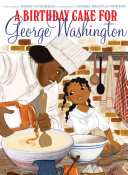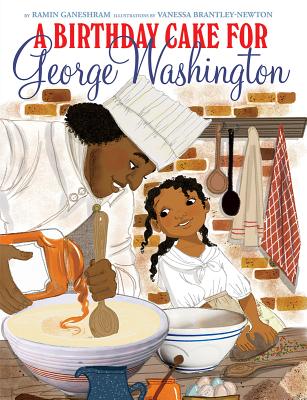Reviewed by Allyson Criner Brown
Review Source: Teaching for Change
Book Author: Ramin Ganeshram
Update: The widespread response to the publication of A Birthday Cake for George Washington has led to its recall by Scholastic. Read about the social media campaign that led to Scholastic stopping distribution of the book.
A Birthday Cake for George Washington, recently published by Scholastic, left us at Teaching for Change, and many others furious and incredulous that this children’s book was published in 2016. Outrage has accumulated online both on social media and in several well-argued critiques of the book, prompting the author and publisher to respond publicly to the controversy.
I highly encourage you to read Edith Campbell, Colleen Mondor, Charles Pulliam-Moore, and Leslie Butler MacFadyen‘s critiques, which raise key issues that I do not address here. I contribute a few more considerations about the book, and address the statements released by author Ramin Ganeshram and Andrea Davis Pinkney of Scholastic Trade Publishing.
In their responses to the backlash, both the author and publisher emphasize their efforts to “present history with the utmost accuracy and care” and suggest that Birthday Cake adds to the diverse depictions of slavery, departing from the “pervasively somber” tone of recently published titles. Ganeshram and Pinkney both emphasize the book’s efforts to illustrate the joy, pride, and dignity of the people Washington owned who served closest to him. Birthday Cake makes a clear effort to demonstrate the brilliance and noteworthy status of Hercules, Washington’s enslaved chef who—stated by Pinkney and in the author’ note—“is often thought of by culinary historians as the first celebrity chef in America.” In their responses, the author and publisher disparage critiques that focus on “the literal face value of the characters.”
A book about Hercules as the first celebrity chef in the U.S. could be a welcome title in a landscape that lacks sufficient quality books by and about people of color, much less about slavery. A book about the relationship between a father and daughter who are in bondage, and how they find ways to reach full personhood and enjoy life’s moments in the midst of slavery would also be welcome. A book that illustrates the relationship of enslaved people to not only George Washington’s birthday, but also to the president himself, could create a tremendous opportunity for “teachable moments” and open an important dialogue. Ganeshram, Pinkney, and Scholastic fail to understand that the story and illustrations fall so far short of these efforts that Birthday Cake takes a step backward, not forward.
Authors and publishers have a charge to take great care with children’s books about topics like slavery in the U.S., but this care cannot be relegated to the book flap or the author’s note. Ganeshram writes in the author’s note that Hercules enjoyed “near-freedom” and that “the Founding Fathers knew being almost free is not the same as being free” (a little too much credit for the Founding Fathers, don’t you think?). What the front flap states, the story fails to accomplish: “No matter how delicious the president’s cake turns out to be, Delia and Papa don’t have the sweetness of freedom.” All in all, Birthday Cake neglects to do what Pinkney claims in her rebuttal: the complex inequities of living in bondage do not, in fact, play a key role in the narrative of this story.
Quite to the contrary, this book suggests that the perks, benefits, and joy they could receive from working closely for a person of stature outweigh the context of their enslavement. Even worse, Birthday Cake presents Hercules and his daughter as proud servants without juxtaposing their bondage to their owner or to the institution of slavery. Hercules enjoyed the perks of theater tickets and was admired by George and Martha Washington, but he was still their property. Even in friendly interactions, they did not engage on a level playing field, or simply as employer-employee. This insinuation is not challenged anywhere in the story and until Hercules is free, his story can only wholly be told if understood in relation to George and Martha Washington. Birthday Cake celebrates a notable chef but makes no attempt to do this in a story for young children. That responsibility lies with the author and publisher.
After blatantly omitting this context within the story, the tale ends with these words spoken by Hercules after President Washington congratulates him on a job well done: “An honor and a privilege, sir… Happy birthday, Mr. President.”
Did Hercules say these words? Possibly, and likely on many occasions. His position as a slave would have required it for survival.
Moreover, Birthday Cake does nothing to allude to the fact that only a year later, the same proud and smiling Hercules would liberate himself by escaping from enslavement at the president’s Mount Vernon estate. This historical truth is mentioned only in the author’s note, along with the fact that Hercules left behind his daughter Delia, the book’s narrator, who remained enslaved after the president’s death because she was owned by Martha Washington.
The Atlanta Black Star, which wrote a short but scathing piece about the controversy, cited Teaching for Change’s Facebook post as a source for the viral outrage and added that Delia’s response to her father’s escape was: “Oh! Sir, I am very glad, because he is free now.”
The author’s note also includes the fact that Hercules’ daughter never worked at the President’s House in Philadelphia. Edith Campbell challenges even more truths behind this story, including Washington’s relationship with his enslaved people.
Since Birthday Cake clearly takes liberties with historical facts to tell a story (as do many books), one has to question the messages that come from the version of this story that made it to print. Pinkney writes that this book “celebrates a holiday that is often discussed in a school setting,” and that “the role African Americans played in celebrating the president’s birthday is not often acknowledged.”
So then, Scholastic, what exactly is the goal of this book? To insert African Americans into the story of George Washington’s life? Into celebrating his birthday? Birthday Cake must have a high market value as a book that double dips into the presidential and Black history categories, yes?
The outcry over Birthday Cake is not just a visceral response to “happy” “smiling” “black slaves.” It is not an attempt to “judge historical figures by modern viewpoints” as Ganeshram opines, although she should note that there is a very real effort in present times to rewrite how children learn about slavery in schools. Indeed, romantic sentiments about how beneficial slavery was for African Americans are more widespread than one might think.
Slavery is a topic that must be handled with care, particularly in children’s books and curriculum, but it can be done well and without, as Ganeshram characterized, pervasive somberness.
Here are titles about slavery for young children that Teaching for Change recommends along with other resources that are relevant to the topic and conversation. Follow the discussion on social media with the hashtag #SlaverywithaSmile.


A Birthday Cake for George Washington by Ramin Ganeshram
Illustrator: Vanessa Brantley-Newton
Published by Scholastic on January 5th 2016
Genres: Holidays and Celebrations, Slavery, U.S. History
Pages: 32
Reading Level: Grades 1-2
ISBN: 9780545538237
Review Source: Teaching for Change

Leave a Reply